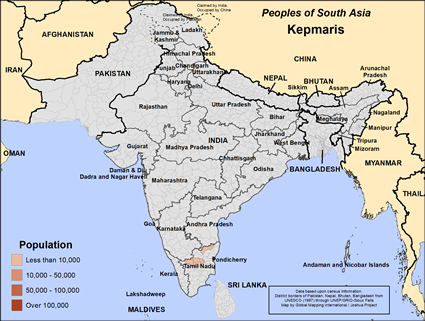The Hindu Kepmaris people live in Tamil Nadu, a state in southern India. Historically, they have engaged in agriculture, with generations of families working on the land to grow crops suited to the region's tropical climate. Over time, the Kepmaris have adapted to shifts in the local economy, balancing their agricultural roots with modern employment opportunities. Despite these changes, agriculture remains central to their way of life.
The Kepmaris people primarily work in farming, cultivating crops such as rice, sugarcane and vegetables. The tropical climate of Tamil Nadu allows for year-round farming, and families rely on both seasonal rains and irrigation systems to support their crops. Many families also keep livestock, such as cattle and goats, to supplement their income and food supply.
Villages are close-knit, with extended families living together and sharing farming responsibilities. Most homes are built from locally sourced materials such as brick and thatch. While many Kepmaris continue to live in rural areas, younger generations have increasingly moved to nearby towns or cities in search of jobs in education, industry and service sectors.
The Kepmaris people practice Hinduism and observe key religious festivals such as Pongal, Diwali and Navratri. They worship deities like Vishnu, Shiva and local gods who are believed to protect the land and provide for a good harvest. Temples and shrines play a central role in village life, where families gather for daily prayers and religious ceremonies.
In addition to temple worship, the Kepmaris people perform rituals tied to farming, such as offering prayers for rain and a successful harvest. These practices are closely linked to the agricultural cycles and reflect their deep reliance on the land.
The Kepmaris people face several challenges, particularly related to economic stability, education and healthcare. Their dependence on traditional farming methods leaves them vulnerable to changes in weather patterns, which can disrupt crop yields and incomes. Improved access to modern agricultural techniques and tools would help boost productivity and provide greater economic security.
Education is another critical need, as many children in rural areas lack access to quality schooling. This limits their opportunities for higher education and employment outside of agriculture. Healthcare services are also limited, with many families traveling long distances for medical treatment.
Development initiatives that focus on improving education, healthcare and agricultural sustainability would greatly benefit the Kepmaris people, helping them secure a more stable future.
Pray for the Holy Spirit to give the Kepmaris people teachable and understanding hearts.
Pray that a strong movement of the Holy Spirit will bring entire Kepmaris families into a rich experience of God's blessing.
Pray for Kepmaris families to be drawn by the Holy Spirit to seek forgiveness, and to understand the adequacy of Christ's work on the cross.
Pray for teams of believers to do sustained, focused prayer for the Lord to open the hearts of Kepmaris family leaders to experience God's blessing through a movement of family-based discovery Bible studies.
Scripture Prayers for the Kepmaris in India.
Ethnologue: Languages of the World
Reports from Indian NGOs on rural communities in Tamil Nadu
Academic research on agriculture and rural development in southern India
| Profile Source: Joshua Project |











